

by John Helmer, Moscow
@bears_with
In the November 25 session of the MH17 trial at Schiphol – the final one for this year — presiding judge Hendrik Steenhuis ruled to accept only those investigations requested by the defence lawyers which are certain to incriminate Lieutenant Colonel Oleg Pulatov. Pulatov is the only one of the four accused to present a defence to the Dutch indictment for destruction of the aircraft and the murder of all 298 passengers and crew on board.
Accepting the state prosecution’s advice to reject the defence lawyers’ attempts to probe evidence for alternative scenarios of the shooting-down of the Malaysian Airlines aircraft on July 17, 2014, Steenhuis said: “if the main scenario cannot be proved” – the prosecution’s case that the Russian military command sent a BUK missile into eastern Ukraine where the four accused fired it – “then that leads automatically to the verdict of not guilty”.
Steenhuis announced he is ready to accept all the self-incrimination Pulatov’s lawyers have already presented from their client. But he insisted that if Pulatov wishes to testify to the court, that must be done in a live interrogation by the court and cross-examination by prosecutors – a condition Steenhuis has disallowed for any other witness in the case.
Steenhuis also ruled to accept the defence lawyers’ request to interview the commander of the Russian Army’s 53rd Anti-Aircraft Missile Brigade on the same terms. Steenhuis has previously refused to allow any evidence or testimony from Russian Army Major General Igor Konashenkov on Ukrainian deployment of BUK missiles, including the one identified by prosecutors as having caused the destruction of the aircraft. The evidence against the 53rd Brigade was fabricated by a NATO propaganda unit; until now it would not have been admissible in the court trial if the defence lawyers had not applied to interview the brigade commander, Colonel Sergei Muchkayev.
Steenhuis also expressed his appreciation for the videotaped interviews the defence lawyers have presented in court with Pulatov, together with a recent film of remarks by Colonel Sergei Dubinsky, the second of the four accused. These films will now be used, Steenhuis ruled, by Dutch government experts and the investigating judge to match Pulatov’s and Dubinsky’s voices with telephone taps prepared by the Ukrainian security service, the SBU. The experts and the investigating judge will remain anonymous, and will not testify directly in court.
In concluding the preliminaries before the trial of Pulatov, Dubinsky, Igor Girkin (Strelkov), and Leonid Kharchenko commences next February 1, Steenhuis’s new ruling anticipates that if the Russian Government decides to dismiss the Dutch defence for incompetence and abandon the show trial, it will appear more guilty than if the Dutch defence had never begun.
The official Dutch record of Wednesday’s proceedings was broadcast here with English voiceover. The Dutch Justice Ministry and Public Prosecution Service do not allow a permanent archive record for public reference.
The Russian state broadcast company RT Ruptly has stopped its free-access archive, and has attempted to charge fees for access. In its place, Sputnik, a rival Russian state news agency, has produced this archive recording.
A summary of the main points of Steenhuis’s ruling can be followed in the HRI twitter stream, prepared by Mark Metcalfe. “It seems quite possible,” Metcalfe included in his record, that the trial “is going to end with acquittals on the basis that the ‘main scenario’ presented by the prosecution is not proven.”
International and Dutch lawyers do not share this optimism. For their assessment of the trial so far, read the book.
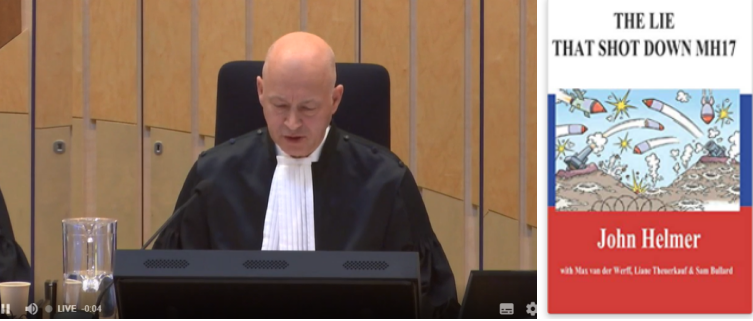
Left: Judge Steenhuis commences reading his final judgement for the year’s trial proceedings; screenshot from the archive recorded by Sputnik. Right: The book has analysed the legal tactics of the judge, prosecution and defence lawyers to conclude that the guilty verdict has been rigged from the beginning, based on evidence fabricated by the Dutch and Ukrainian governments which would be inadmissible in an Anglo-American court.
Steenhuis read for ninety minutes from the written text of his ruling. He announced he will take another week before the text of the ruling will be published in Dutch, and several more days of delay before he will sign the official English translation for publication.
Tass, the Russian state news agency, reported: “most defence requests were rejected, however, some of them were granted”.
Radio Free Europe, the US state news agency, reported in greater detail that Steenhuis had judged “the defense had not provided a clear alternative scenario to investigate. Steenhuis said the court would like to hear from Pulatov in person, and would not submit written questions to him, as his lawyers had requested. He added the court would also like to hear from the other suspects, who have never cooperated with the court….Judges also ruled that a new effort should be made to speak to the leader of Russia’s 53rd Brigade, which has been identified by investigators as having transported the missile launcher.”
The BBC, the British state news agency, and Deutsche Welle, the German state organ, both ignored the latest session of the Dutch court.
Steenhuis repeatedly faulted the defence lawyers, Boudewijn van Eijck (lead image, left) and Sabine ten Doesschate (right). He began his attack on their delaying requests for investigation of the prosecution’s evidence until earlier this month when they “could have been made earlier” (Min 8:53). The judge went on to chastise them for presenting Pulatov’s statement in September which “neither differs from nor is more specific than the statement he apparently made to his lawyers in February 2020” (Min 8:43).
Steenhuis told ten Doesschate and van Eijck that he would not accept unsubstantiated requests for investigation which he judged to be “anything other than a fishing expedition, and the court sees no interest that requires additional investigation” (Min 11:11). He added that many of their attempts to pursue fresh investigations of witnesses and experts were “meaningless” (Min 14:02) because they were repeating what had already been done. It was up to the court, he said, when concluding its verdict at the end of the trial, to decide on evidentiary value, but not up to the defence lawyers now to “dispute the evidentiary value”. (Min 13:52).
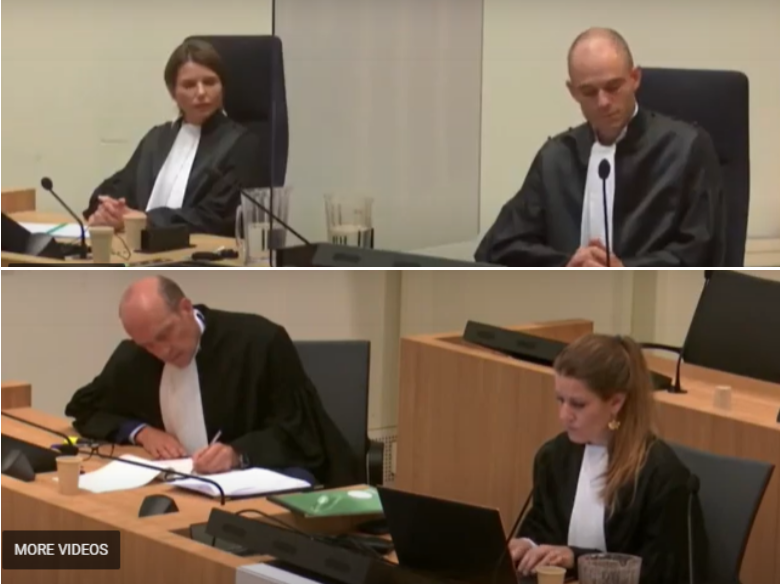
Top: the two prosecutors in court for the November 25 hearing, left, Manon Ridderbecks and right, Ward Ferdinandusse, their hands clasped in front of them. Bottom: as the judge read from his script, the defence lawyers took copious notes; the prosecutors appeared to know in advance what the judge would say.
Steenhuis said he has found the defence attempts to promote alternative scenarios of what caused the MH17 downing to be discreditable in legal terms. “This main scenario [BUK attack by the accused] will have to be proven, and the alleged involvement of the defendant based on legal evidence will have to be substantiated in a convincing way. Now if the Public Prosecution Service does not succeed to provide this evidence to base the indictment on, then acquittal will follow” (Min 17:17). Steenhuis went on to tell the defence it “does not have to prove an alternative scenario” (Min 17:30).
However, Steenhuis qualified what he will accept for proof by declaring he prefers the evidence of Dutch government experts to witnesses at the scene in eastern Ukraine, including Pulatov, Dubinsky, the two others accused, or other Russian source evidence. “Generally speaking, objective forensic expert evidence has more evidentiary value than a witness statement” (Min 19:32). Steenhuis implied that if there is a conflict of evidence between the Dutch experts and the others, he will favour the Dutch. He said he rules out cross-examination by the defence lawyers of the Dutch experts. If the defence lawyers believe the experts have shown bias, this cannot be investigated now, Steenhuis said, but may be addressed later during the trial next year.
The dates for the trial have now been fixed, starting on February 1 and concluding on November 19:
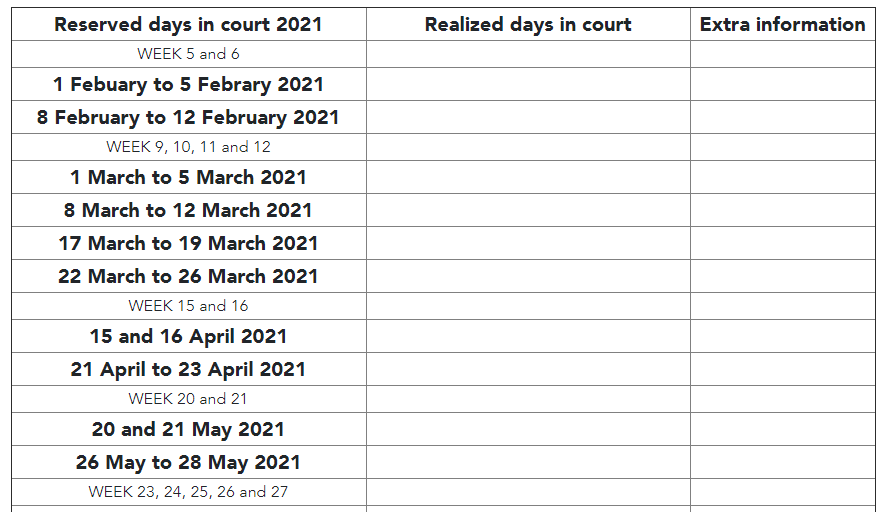
Source: https://www.courtmh17.com/
As for fresh investigations Steenhuis said he will allow, those must be delegated to the investigating judge, without a direct role for the defence lawyers. These investigations, he said, may run in parallel with the main trial, but behind closed doors. The Dutch court refuses to identify the investigating judge by name, or open the record of his evidence-taking.
Steenhuis dismissed an application by the defence lawyers to cross-examine Ukrainian military experts on the evidence they have given regarding BUK missiles in the Ukrainian Army inventory and how they are operated. The application was “insufficiently motivated or relevant” (Min 35:20).
On the other hand, Steenhuis ruled that Russian personnel of the 53rd Anti-Aircraft Missile (AAM) Brigade should become a new target for interview by the investigating judge because the defence lawyers have requested it. “It is obviously important to put the question – is it in fact the case that members of the 53rd AAM Brigade were involved in transporting and firing a BUK missile which hit the MH17, and if so under what circumstances…” (Min 50:39)
Steenhuis singled out the current brigade commander for questioning, Colonel Sergei Muchkayev. He noted that the Russian authorities had refused to allow this line of investigation when it was promoted in the press by NATO intelligence sources. “But in this case now,” Steenhuis declared, “it is not a request from the Public Prosecution Service but from a defendant who is a citizen who is a citizen of the Russian Federation” (Min 51:00). Asked whether they believe the Dutch defence lawyers made a serious error in applying to question Muchkayev, Russian legal observers refuse to comment publicly.
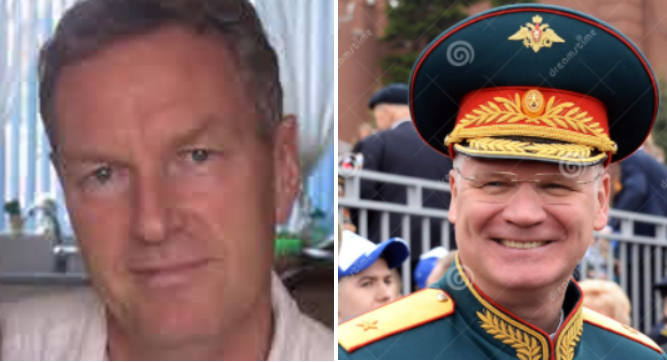
Left, Colonel Sergei Muchkayev, approved for questioning by the Dutch court. Right, Major General Igor Konashenkov, rejected for questioning by the Dutch court; for details, read this.
Steenhuis was also happy to allow the videotaped statements which defence lawyers have made of their client Pulatov in Moscow, in order to submit them to Dutch expert examination of the voice prints, and allow the Dutch investigating judge to decide if they match the SBU intercepts previously provided in the prosecution case file. For the videotapes of Pulatov and also of Dubinsky, click to view. Anglo-American lawyers express incredulity that ten Doesschate and van Eijck have exposed the Russian defendants to this hazard of self-incrimination.
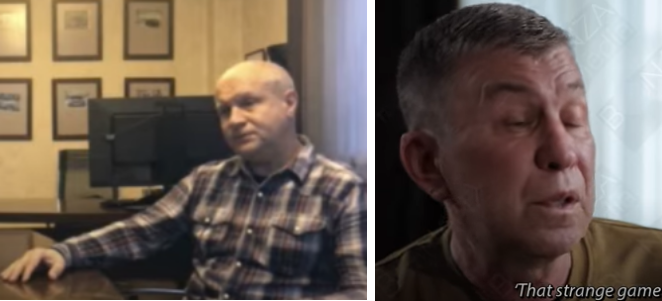
Left: Lieutenant Colonel Oleg Pulatov in the videotaped interview presented to the court on November 3, 2020. Right: Colonel Sergei Dubinsky, in his videotaped interview of October 30, 2020.
Steenhuis told Pulatov that if he wants to say more in his defence, he is invited to come to court. Alternatively, he must present himself by live videolink to be questioned by the judge and the lawyers. The defence lawyers’ request that the questions for Pulatov should be submitted in advance in writing was dismissed. “The court has a number of questions for the defendant,” Steenhuis said. “The defendant is therefore invited, again, to attend the hearing with his counsel and the prosecution to publicly answer the questions, not only from the court, but also from other parties in the case, publicly before the court. This is the normal method of proceeding…The court will therefore not make any question to the defendant in writing” (Min 1:15:19-33).
On December 8, an official court translation into English of Judge Steenhuis's ruling was released on the court website. Click to read here.











Leave a Reply